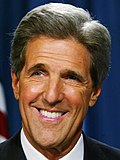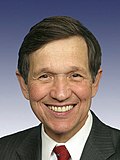
Each of the 50 U.S. states, the District of Columbia, and territories of the United States holds either primary elections or caucuses to help nominate individual candidates for president of the United States. This process is designed to choose the candidates that will represent their political parties in the general election.

From January 14 to June 8, 2004, voters of the Democratic Party chose its nominee for president in the 2004 United States presidential election.

The 2004 Iowa Democratic presidential caucuses were an election held on January 19 as part of the United States presidential primary. They were the first major test of some of the leading contenders for the Democratic Party's nomination as its candidate for the 2004 United States presidential election.

Super Tuesday is the United States presidential primary election day in February or March when the greatest number of U.S. states hold primary elections and caucuses. Approximately one-third of all delegates to the presidential nominating conventions can be won on Super Tuesday, more than on any other day. The results on Super Tuesday are therefore a strong indicator of the likely eventual presidential nominee of each political party.

Mini-Tuesday was the name given to the February 3, 2004 U.S. presidential primary where several states, which to that point had participated in "Super Tuesday," cast their votes for the Presidential nominees of the 2004 Presidential election. Mini-Tuesday was also called Super Tuesday I. With the large number of states moving their election dates up to Mini-Tuesday for the 2008 election cycle, pundits have largely shied away from using the term again, instead choosing to reappropriate the term "Super Tuesday" to better represent the primaries held on that approximate date. The date is also known as "Super Duper Tuesday," "Giga Tuesday," and "Tsunami Tuesday," among others, with the term "Mini Tuesday" falling to apparent disuse for the time being.

The 2004 United States presidential election in South Carolina took place on November 2, 2004, as part of the 2004 United States presidential election which took place throughout all 50 states and D.C. Voters chose eight representatives, or electors to the Electoral College, who voted for president and vice president.

The 2008 United States presidential election in Iowa took place on November 4, 2008, as part of the 2008 United States presidential election. Voters chose seven representatives, or electors to the Electoral College, who voted for president and vice president.

The 2004 Arizona Democratic presidential primary took place on February 3, 2004, as part of the 2004 United States Democratic presidential primaries. The delegate allocation is Proportional. the candidates are awarded delegates in proportion to the percentage of votes received and is open to registered Democrats only. A total of 55 delegates are awarded proportionally. A 15 percent threshold is required to receive delegates. Frontrunner John Kerry won the primary with former general Wesley Clark coming second.

The 2004 Washington Democratic presidential caucuses were held on February 7, 2004. The Caucus is open to registered Democrats and Independents. The delegate allocation is proportional, the candidates are awarded delegates in proportion to the percentage of votes received. A total of 76 delegates are awarded proportionally. A 15 percent threshold is required to receive delegates. No actual convention delegates are awarded at the caucuses, rather each precinct caucus chooses delegates to attend the County Convention.

The 2004 Maine Democratic presidential caucuses took place on February 8, 2004, as part of the 2004 United States Democratic presidential primaries. The delegate allocation is Proportional. the candidates are awarded delegates in proportion to the percentage of votes received and is open to registered Democrats only. A total of 24 delegates are awarded proportionally.

The 2004 Virginia Democratic presidential primary took place on February 10, 2004 as part of the 2004 United States Democratic presidential primaries. The delegate allocation is proportional; the candidates are awarded delegates in proportion to the percentage of votes received and is open to anyone. A total of 82 delegates are awarded proportionally. A 15 percent threshold is required to receive delegates. Frontrunner John Kerry won the primary with Senator John Edwards obtaining over 20% and receiving delegates.

The 2004 Wisconsin Democratic presidential primary took place on February 17, 2004 as part of the 2004 Democratic Party presidential primaries. The delegate allocation is Proportional. The candidates are awarded delegates in proportion to the percentage of votes received and is open to registered Democrats only. A total of 72 delegates are awarded proportionally. A 15 percent threshold is required to receive delegates. John Kerry won the primary with John Edwards coming in second.

The 2004 Wyoming Democratic presidential caucuses took place on February 3, 2004, as part of the 2004 Democratic Party presidential primaries. The delegate allocation is Proportional, the candidates are awarded delegates in proportion to the percentage of votes received.

The 2004 Maryland Democratic presidential primary took place on March 2, 2004 as part of the 2004 Democratic Party presidential primaries. The delegate allocation is proportional; candidates are awarded delegates in proportion to the percentage of votes received, open to registered Democrats only. Frontrunner John Kerry won the primary with former Senator John Edwards coming in a distant second.

The 2012 United States presidential election in Louisiana took place on November 6, 2012, as part of the 2012 United States presidential election in which all 50 states plus the District of Columbia participated. Louisiana voters chose eight electors to represent them in the Electoral College via a popular vote pitting incumbent Democratic President Barack Obama and his running mate, Vice President Joe Biden, against Republican challenger and former Massachusetts Governor Mitt Romney and his running mate, Congressman Paul Ryan.

The 2012 United States presidential election in Kansas took place on November 6, 2012, as part of the 2012 United States presidential election in which all 50 states plus the District of Columbia participated. Kansas voters chose six electors to represent them in the Electoral College via a popular vote pitting incumbent Democratic President Barack Obama and his running mate, Vice President Joe Biden, against Republican challenger and former Massachusetts Governor Mitt Romney and his running mate, Congressman Paul Ryan. Romney and Ryan carried the state with 59.59 percent of the popular vote to Obama's and Biden's 38.00 percent, thus winning the state's six electoral votes.

The 2008 United States presidential election in New Hampshire took place on November 4, 2008, as part of the 2008 United States presidential election throughout all 50 states and the District of Columbia. Voters chose four representatives, or electors to the Electoral College, who voted for president and vice president.
Democrats Abroad holds a primary awarding delegates to the Democratic National Convention to represent expatriate voters. This primary is conducted as part of the Democratic Party's presidential primaries. In some earlier elections, in place of a primary, a caucus system was used by Democrats Abroad to determine their convention delegations.

The 2004 Tennessee Democratic presidential primary was held on February 10 in the U.S. state of Tennessee as one of the Democratic Party's statewide nomination contests ahead of the 2004 presidential election. The primary determined 69 delegates to the 2004 Democratic National Convention, who were awarded on a proportional basis. John Kerry won with 41.02% of the vote and was awarded 31 delegates.
















